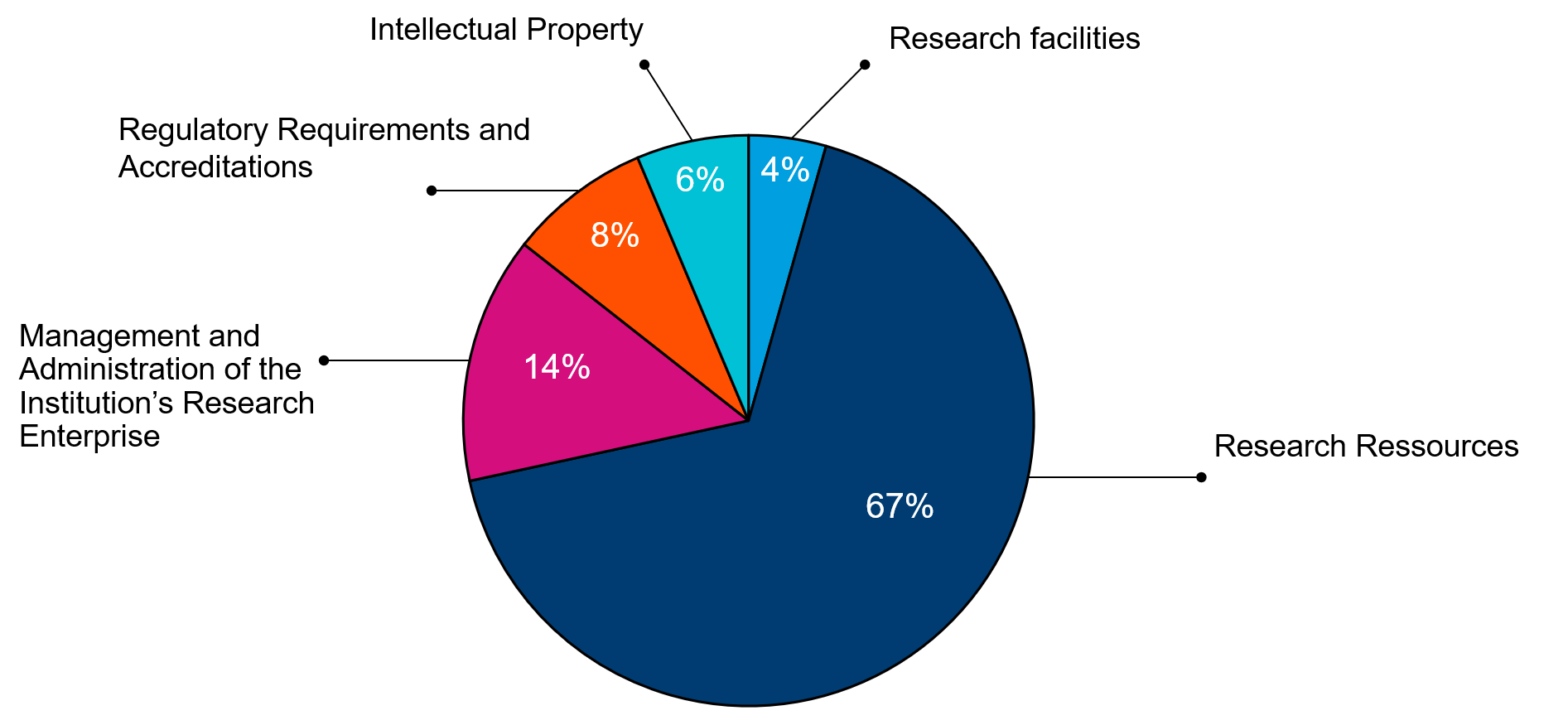Research Support Fund
The Research Support Fund helps Canadian post-secondary institutions pay for the indirect costs of research. By reducing the financial burden of hidden expenses such as lighting and heating, this program allows researchers to devote their energy to cutting-edge discoveries and excellence.
Whether it be the salaries of staff who provide administrative support for monitoring grants and helping our professor-researchers prepare grant applications, these hidden, or «indirect», costs of research represent a significant challenge for Canadian institutions.
The Government of Canada introduced the Indirect Costs Program, now called Research Support Fund, in 2003 in order to assist post-secondary institutions with these real and necessary costs. This program, which is permanent, provides Canadian universities and colleges with an annual grant to help pay for a portion of their indirect research costs.
Regardless of whether the funds are used for the maintenance of libraries, laboratories or research networking spaces, the aim of the program is the same: to ensure the ability of Canadian research institutions to operate at the leading edge.
Every year, the federal government invests in research projects through its three granting agencies:
- the Social Sciences and Humanities Research Council (SSHRC);
- the Natural Sciences and Engineering Research Council (NSERC); and
- the Canadian Institutes of Health Research (CIHR).
The Research Support Fund reinforces this research investment by helping institutions ensure that their federally funded research projects are conducted in world-class facilities with the best equipment and administrative support available.
Research security
In the 2022 Federal Budget , the Government of Canada introduced new funding opportunities through the Research Support Fund (RSF) to further support activities pertaining to the indirect costs of research security, and to support the National Security Guidelines for Research Partnerships.
The investments in research security will provide $125 million over a five-year period, starting in 2022-23, and $25 million ongoing each year, in addition to the existing investments for the RSF and Incremental Grant Projects (IPGs).
Research security now constitutes a fifth priority area of the IPGs. These investments are aligned with the RSF’s objectives aiming to help Canadian postsecondary institutions ensuring that their federally funded research projects are conducted in world-class facilities, with the best equipment and administrative support available. By directing funds to specific investments, and to annual or multiyear projects initiated by institutions, research security funding will help building capacity within postsecondary institutions to identify, assess and mitigate the potential risks to research security.
Research security funding is calculated as a percentage of each institution’s eligible direct research funding amounts above $2 million. Funding is awarded for one year only. Institutions must re-apply each year and meet all terms and conditions to continue receiving funds. Research security funding will be calculated and dispersed to institutions separately from the RSF and IPG allocations. The funds granted to institutions should be used to build capacity to identify, assess and mitigate potential risks to research security, in support of the full implementation of the National Security Guidelines on Research Partnerships. Institutions must spend the funds in the year of the award and report on the use of these funds annually. Research security funds can be used to support multiyear projects whose outcomes will be available only at the end of a longer period of up to three years. The application allows the institution to apply for funding for the next phase of the project, providing that it continues to meet reporting and eligibility requirements.
Allocation of the Research Support Fund between the main expenditure areas
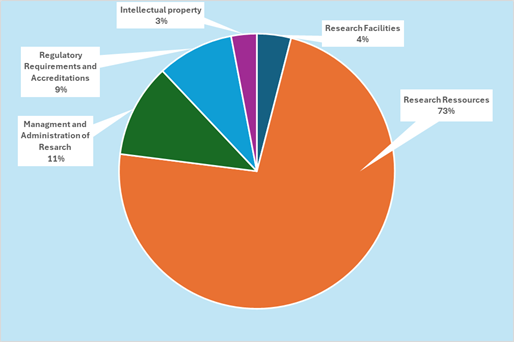
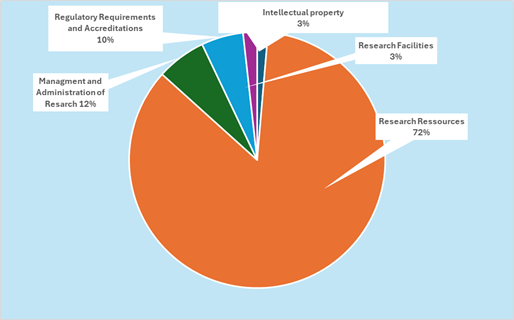
In 2023-2024, HEC Montréal received funding totalling $1,599,104 from the Government of Canada to help pay for a portion of its indirect research costs. This funding was distributed between the main expenditure areas appearing in the figure above. In addition, HEC Montréal received $22,245 from the Government of Canada to be dedicated to Research Security.
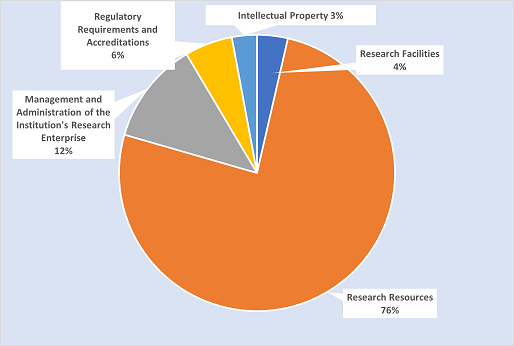
In 2022-2023, HEC Montréal received funding totalling $1,560,574 from the Government of Canada to help pay for a portion of its indirect research costs. This funding was distributed between the main expenditure areas appearing in the figure above. In addition, HEC Montréal received $22,095 from the Government of Canada to be dedicated to Research Security.
For 2023-2024, HEC Montréal expects to receive $1,599,104 in RSF and $22,245 for Research Security.
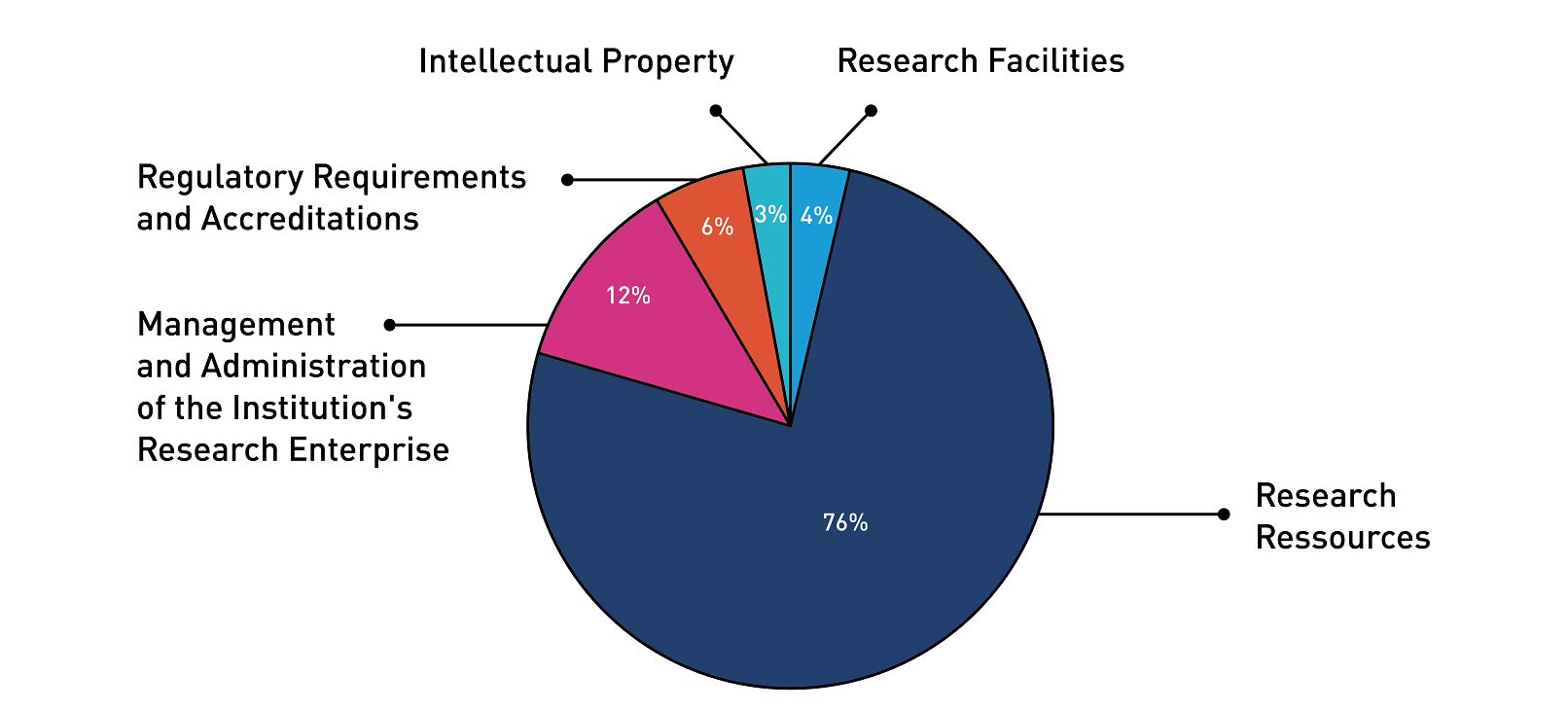
In 2021-2022, HEC Montréal received funding of $1,444,906 from the Government of Canada to help pay for a portion of its indirect research costs. This funding was allocated between the main expenditure areas appearing in the above figure.
For 2022-2023, HEC Montréal expects to receive $1,560,574.
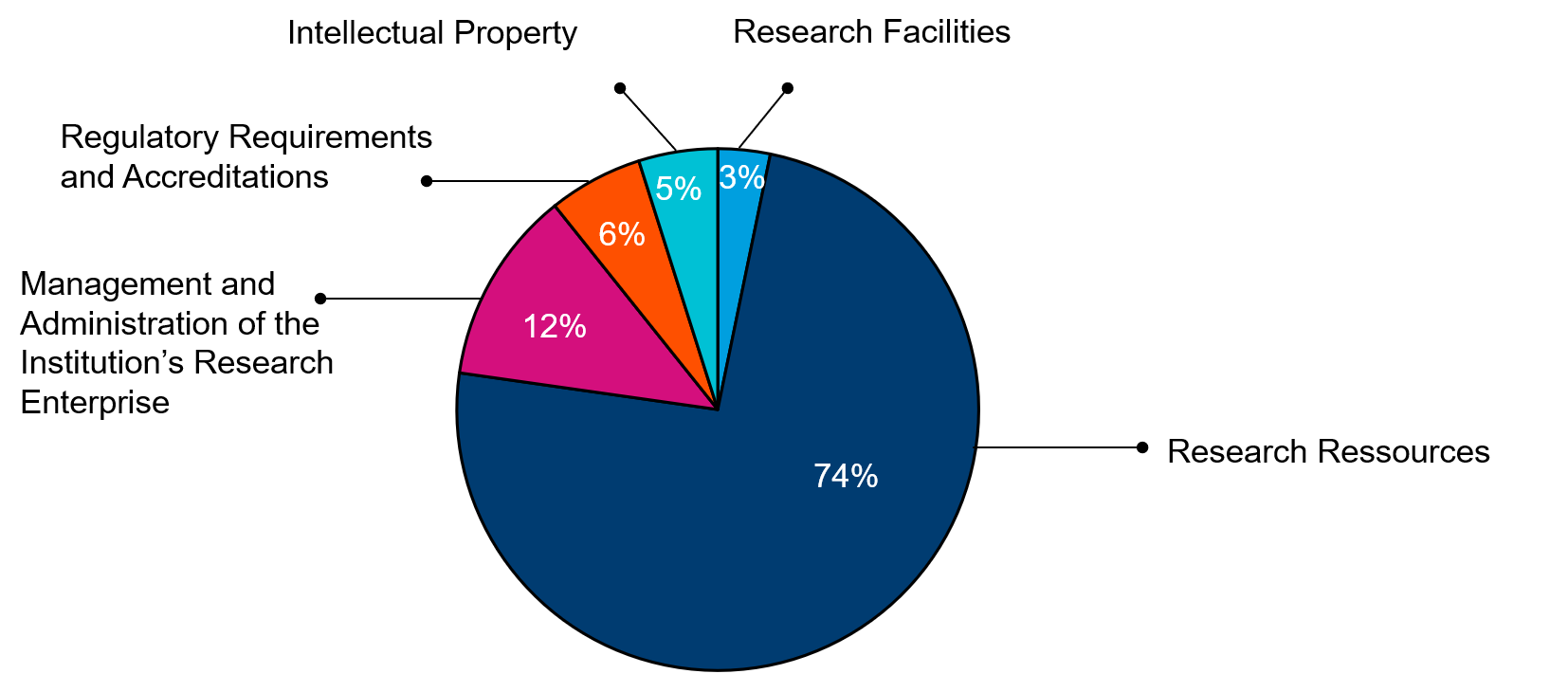
In 2020-2021, HEC Montréal received funding of $1,351,345 from the Government of Canada to help pay for a portion of its indirect research costs. This funding was allocated between the main expenditure areas appearing in the above figure.
For 2021-2022, HEC Montréal expects to receive $1,444, 906.
In 2019-2020, HEC Montréal received funding of $1,132,429 from the Government of Canada to help pay for a portion of its indirect research costs. This funding was allocated between the main expenditure areas appearing in the above figure.
For 2020-2021, HEC Montréal expects to receive $1,351,345.
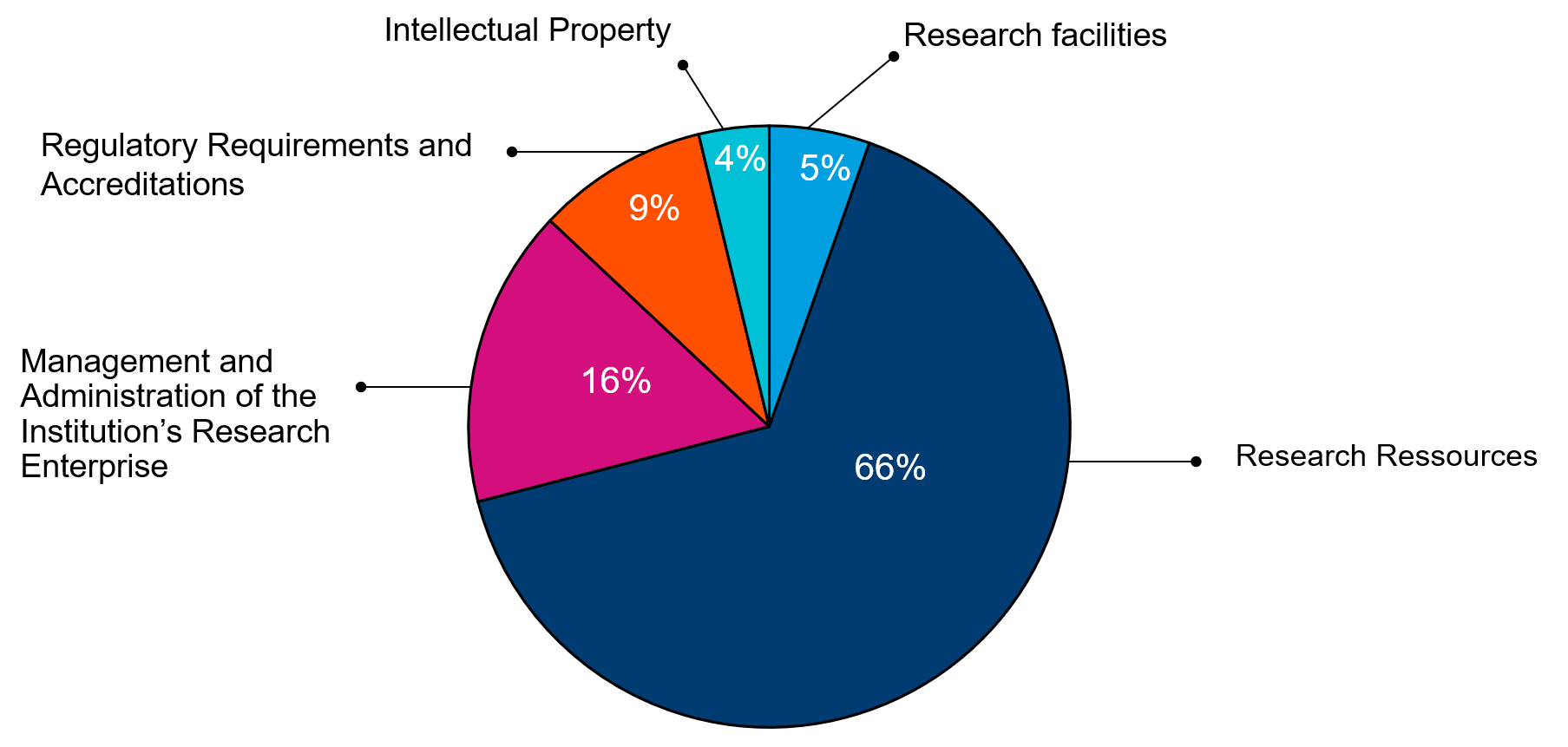
In 2018-2019, HEC Montréal received funding of $964, 416 from the Government of Canada to help pay for a portion of its indirect research costs. This funding was allocated between the main expenditure areas appearing in the above figure.
For 2019-2020, HEC Montréal expects to receive $1,132, 429.
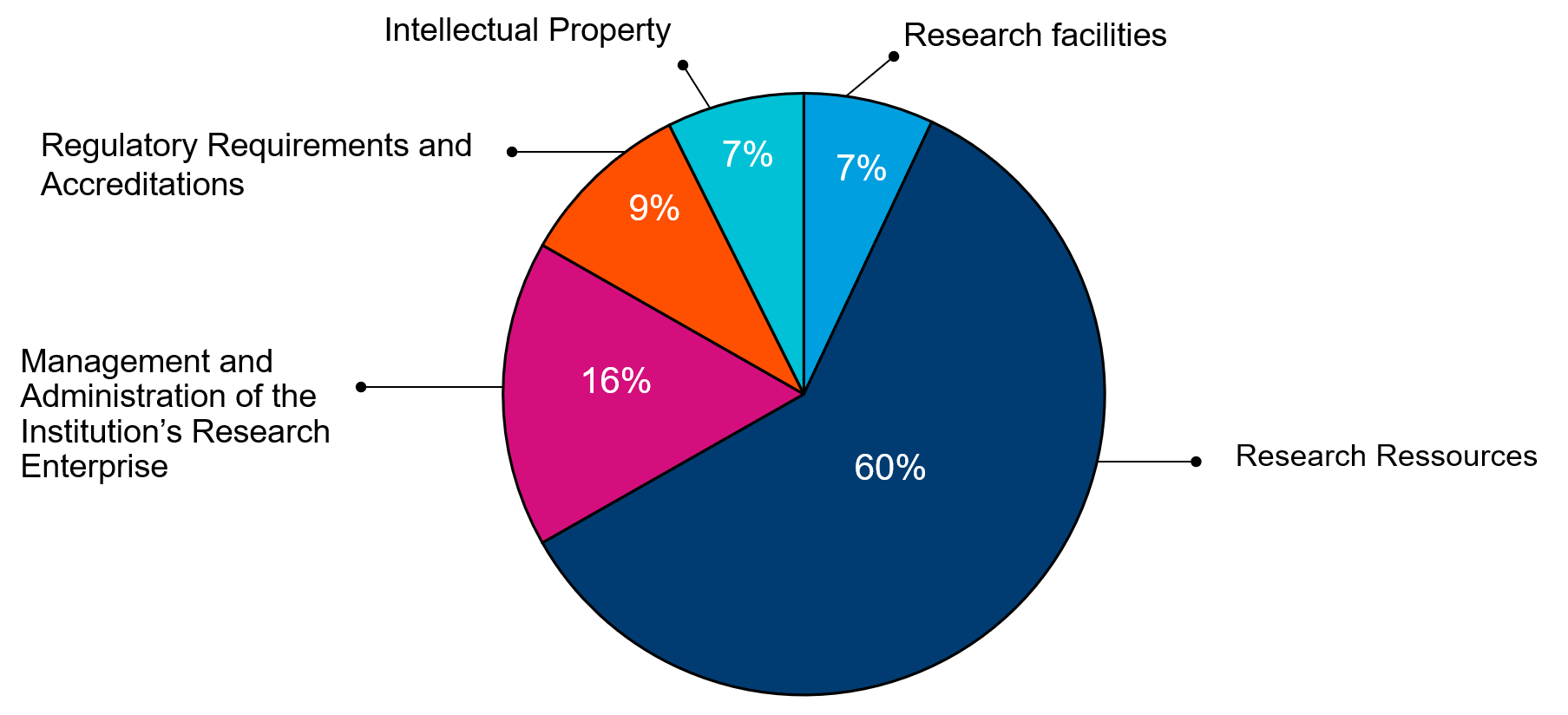
In 2017-2018, HEC Montréal received funding of $915,475 from the Government of Canada to help pay for a portion of its indirect research costs. This funding was allocated between the main expenditure areas appearing in the above figure.
For 2018-2019, HEC Montréal expects to receive $964, 416.
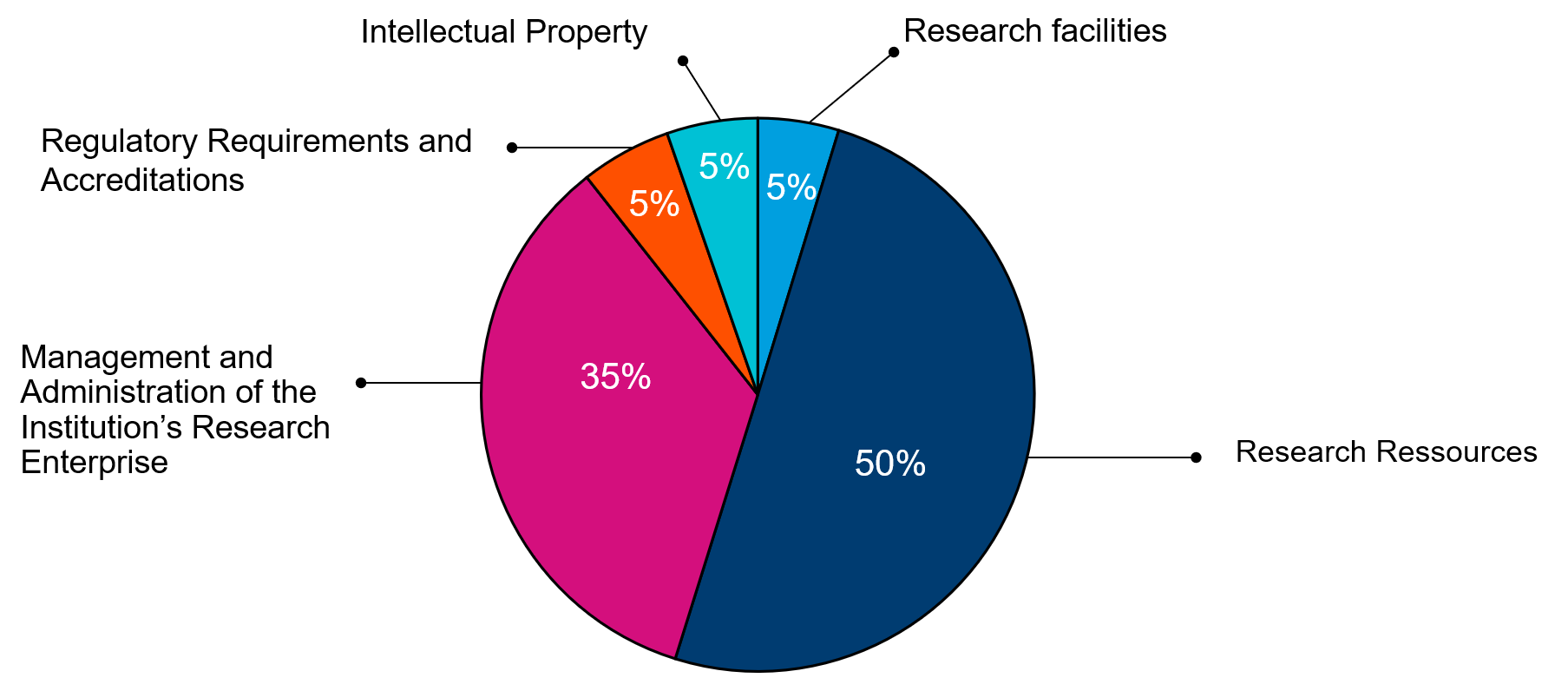
In 2016-2017, HEC Montréal received funding of $950,692 from the Government of Canada to help pay for a portion of its indirect research costs. This funding was allocated between the main expenditure areas appearing in the above figure.
For 2017-2018, HEC Montréal expects to receive $915,475.
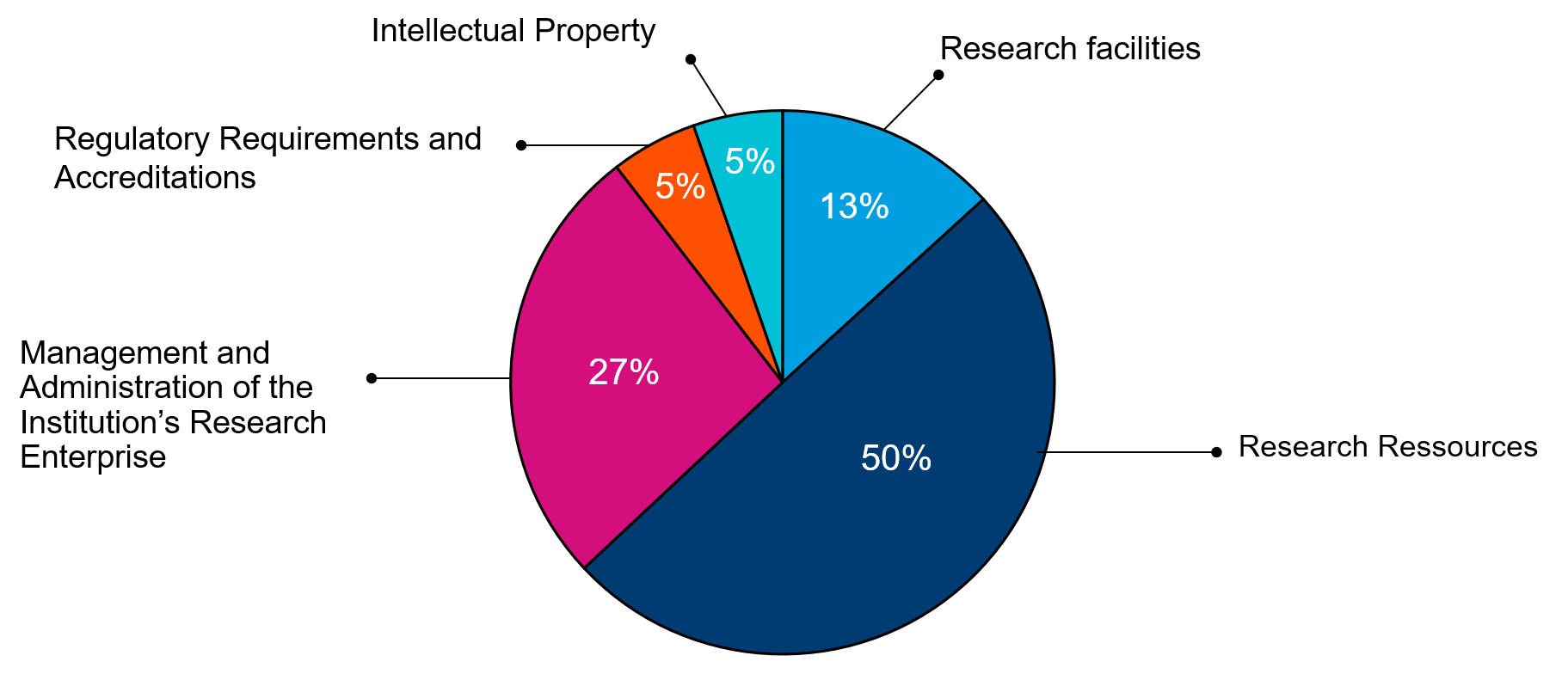
In 2015-2016, HEC Montréal received funding of $929,211 from the Government of Canada to help pay for a portion of its indirect research costs. This funding was allocated between the main expenditure areas appearing in the above figure.
For 2016-2017, HEC Montréal expects to receive $950,692.
Expenditure Areas
Expenditure areas |
|
| Research Facilities | The grant helps to maintain the quality of technical support for research laboratories and offices and offsets a portion of the actual expenditures related to their operating costs. |
| Research Resources |
The Research Support Fund grant supports the maintenance of research resources. For example, HEC Montréal boasts one of the best existing bilingual business library. This library is known for its vast digital collection and resources. The grant helps offset the cost of acquiring electronic subscriptions. |
| Management and Administration of the Institution’s Research Enterprise |
A significant proportion of the grant is allocated to expenses related to the salaries of Research Office staff, notably for staff who provide administrative support for monitoring grants and helping our professor-researchers prepare grant applications. Thanks to the Research Support Fund grant, the Research Office can offer researchers access to the best resources and services in research grant management. This funding is essential for maintaining our research activities and ensuring our capacity to recruit the necessary expertise to respond to the numerous requests we receive from our researchers. |
| Regulatory Requirements and Accreditation | Research ethics is a constantly evolving field, and to make sure that our researchers comply with ethical requirements, HEC Montréal is committed to giving the Research Ethics Board (REB) the human, financial and material resources it needs to fulfil its mission of defining and implementing a policy that meets the requirements of Canada’s three granting agencies. |
|
|
The Research and Knowledge Transfer Office is responsible for the enforcement of policies relating to intellectual property. The grant covers a portion of the cost of administrative support for administering partnership agreements, developing business opportunities, and commercializing academic research. |
|
Research Security |
The growing threats to post-secondary education sector, and more specifically to scientific research, makes Research Security a strategic issue for our institution, both in terms of legal compliance and data protection. Funding from the Canadian Government allows HEC Montréal to put in place clear and sound research security measures to protect data, research infrastructures and people involved in research. The federal government's research security fund allows us to meet these objectives by supporting training and awareness of research security issues in our community, as well as funding the establishment of a committee responsible for defining and implementing specific actions to be taken to better detect and mitigate risks in our relations and partnership with external organization, both foreign and domestic. |
Impact of Research Support Fund Grant
HEC Montréal has experienced a global increase in its research activities over the past years. The funding offered by the Research Support Fund allows it to make the additional investments needed to improve research resources and adequately maintain the infrastructure that is essential to creating a high-quality research environment.
A lack of funding for indirect research costs would greatly compromise the quality, the timely production of results and the benefits of research projects at HEC Montréal.
Progress Report on Performance Objectives
Research facilities |
|
| Institutional performance objective | Optimize spaces in regard to research needs (library, laboratories, offices of researchers and their students) |
| Indicator | Optimal layout/ organization of research spaces |
| Output | Proportion of the Research Support Fund grant dedicated to the operating costs of research spaces |
| Outcomes reported at year end | To be provided by June 30, 2025 |
Research resources |
|
| Institutional performance objective | Maintain electronic subscriptions (databases, books and scientific journals) used by researchers and identified as essential by the community |
| Indicator | Amount dedicated to electronic subscriptions |
| Output | Proportion of the Research Support Fund grant invested in the payment of electronic subscriptions |
| Outcomes reported at year end | To be provided by June 30, 2025 |
Management and administration |
|
| Institutional performance objective | Provide administrative and financial support services of the highest quality to meet research needs. |
| Indicator | Grants obtained for the current period |
| Output | Proportion of the Research Support Fund invested in the remuneration of the Research and Knowledge Transfer Office (RKTO) team |
| Outcomes reported at year end | To be provided by June 30, 2025 |
Regulatory requirements and accreditation |
|
| Institutional performance objective | Improve the efficiency of the certification application management by the Research Ethics Board (REB) |
| Indicator | Time allocated to process/ approve applications |
| Output | Proportion of the Research Support Fund grant invested in the remuneration of Research Ethics Board employees, which allows HEC Montréal to invest in an accreditation management system (NAGANO). |
| Outcomes reported at year end | To be provided by June 30, 2025 |
Intellectual property |
|
| Institutional performance objective | Continue supporting research knowledge transfer and partnership development |
| Indicator | Number of research contracts |
| Output | Proportion of the Research Support Fund grant dedicated to the employee in charge of the protection of intellectual property. |
|
Outcomes reported at year end |
To be provided by June 30, 2025 |
Research Security – 25 253 $ (subsidized portion) |
|
| Project 1: Data and computer security awareness at HEC Montréal | |
| Expected funding | $15,253 |
| Institutional performance objective | Provide faculty and research staff with the knowledge and tools they need to protect academic and research data, and to integrate secure practices into their teaching and research activities. |
| Indicator | Number of consultations of the Guide de gestion sécuritaire des données de recherche on the HEC Montréal intranet and number of people who participated in workshops and information sessions to raise awareness of research security issues. |
|
Output |
Proportion of the Research Security funding dedicated to this initiative |
|
Outcomes reported at year end |
To be provided by June 30, 2025 |
| Project 2: Research safety monitoring with external partners at HEC Montréal | |
| Expected funding | $10,000 |
| Institutional performance objective |
|
| Indicator | The number of attestation forms for non-affiliations with organizations named in the list of affiliations of concern; the number of consultations of the research security guide on the School's intranet, the number of individual meetings organized by research advisors and the maintenance of a low number of security incidents in research collaborations. |
|
Output |
Proportion of the Research Security funding dedicated to this initiative |
|
Outcomes reported at year end |
To be provided by June 30, 2025 |
Research facilities |
|
| Institutional performance objective | Optimize spaces in regards to research needs (library, laboratories, offices of researchers and their students) |
| Indicator | Optimal layout/ organization of research spaces |
| Output | Proportion of the Research Support Fund grant dedicated to the operating costs of research spaces |
| Outcomes reported at year end | Maintenance costs for the Louis-Collins building, where the largest UX lab in North America is located (HEC Montreal’s Tech3Lab), are covered by the Research Support Fund (RSF) grant (3% of RSF in 2023-2024). This building enables us to centralize most research activities of the Tech3Lab and ERPsim Lab, bringing together professors, researchers, students and technicians under the same roof and maximizing research efforts. |
RESEARCH Resources |
|
| Institutional performance objective | Maintain electronic subscriptions (databases, books and scientific journals) used by researchers and identified as essential by the community |
| Indicator | Amount dedicated to electronic subscriptions |
| Output | Proportion of the Research Support Fund grant invested in the payment of electronic subscriptions |
| Outcomes reported at year end | 72% of the RSF grant helps renew subscriptions to electronic databases. HEC Montreal also invested more than $3.6M for electronic subscriptions in 2023-2024. |
Management and administration |
|
| Institutional performance objective | Provide administrative and financial support services of the highest quality to meet research needs. |
| Indicator | Grants obtained for the current period |
| Output | Proportion of the Research Support Fund invested in the remuneration of the Research and Knowledge Transfer Office (RKTO) team |
| Outcomes reported at year end | 12% of the Research Support Fund grant contributes to the remuneration of the Research and Knowledge Transfer Office (RKTO) team. The RKTO staff administers funding from the federal research councils, ensuring the application of all norms, rules, and best practices of public research funding management. In 2023-2024, members of the RKTO managed a total portfolio of more than $45 million in research and knowledge transfer funding. |
Regulatory requirements and accreditation |
|
| Institutional performance objective | Improve the efficiency of the certification application management by the Research Ethics Board (REB) |
| Indicator | Time allocated to process/ approve applications |
| Output | Proportion of the Research Support Fund grant invested in the salaries of Research Ethics Board employees, which allows HEC Montréal to invest in the accreditation application management system (NAGANO) |
| Outcomes reported at year end | The accreditation application management system (NAGANO) improves the efficiency of the Research Ethics Board. In 2023, HEC Montréal’s REB processed 738 applications for ethics approval, while 60% of new projects were processed in less than 42 days. |
Intellectual property |
|
| Institutional performance objective | Continue supporting research knowledge transfer and partnership development |
| Indicator | Number of research contracts |
| Output | Proportion of the Research Support Fund grant dedicated to the employee in charge of the protection of intellectual property. |
| Outcomes reported at year end |
The Research Support Fund contributes to the remuneration of our Intellectual Property and Knowledge Transfer Advisor. In 2023-2024, the advisor contributed to process 69 research and knowledge transfer agreements and contracts, totalling more than $4 million in additional funding. |
Research Security – $22,245 (subsidized portion) |
|
| Project 1: Building awareness for HEC Montréal’s professors and researchers on research security issues | |
| Expected funding | $12,245 |
| Institutional performance objective | Identification of safe research data management practices. Design and organization of a Research Security Awareness Workshop |
| Indicator | Number of consultations of the Guide to the secure management of online research data and number of participants in the Research Security Awareness Workshop |
|
Output |
Portion of the Research Security Fund invested in this project. |
|
Outcomes reported at year end |
A guide and newsletter on information security were deployed in January 2024 on the School's new intranet site. As of June 1, 2024, the international security page had been consulted more than 300 times by the School’s professors and staff, while two newsletters had been sent to the entire École community concerning measures to be taken with regard to the security of research information and the protection of personal information. In addition, 70 professors and 57 employees from the School's research and transfer units completed the research data security and personal information protection training workshop. |
| Project 2: Protecting data, infrastructure and people involved in research | |
| Expected funding | $12,000 |
| Institutional performance objective | Set up a committee to ensure risk mitigation and detection in the relationships between École members and their research partners. |
| Indicator | Establishment of criteria for assessing research safety in our research partnerships. |
|
Output |
Portion of the Research Security Fund invested in this project |
|
Outcomes reported at year end |
All research agreements signed by the School between June 1, 2023 and May 31, 2024 (69 agreements with funding and over 150 agreements without funding) have been analyzed for research security risks, according to four main criteria: the partner organization's level of risk with regard to its activities abroad; the nature of the research in terms of sensitive areas; the interests of the researchers involved in the project; the type of data collected and used as part of the collaboration |
Research facilities |
|
| Institutional performance objective | Optimize spaces in regards to research needs (library, laboratories, offices of researchers and their students) |
| Indicator | Optimal layout/ organization of research spaces |
| Output | Proportion of the Research Support Fund grant dedicated to the operating costs of research spaces |
| Outcomes reported at year end | Maintenance costs for the Louis-Collins building, where the largest UX lab in North America is located (HEC Montreal’s Tech3Lab), are covered by the Research Support Fund (RSF) grant (4% of RSF in 2022-2023). This building enables us to centralize most research activities of the Tech3Lab and ERPsim Lab, bringing together professors, researchers, students and technicians under the same roof and maximizing research efforts. |
Research Resources |
|
| Institutional performance objective | Maintain electronic subscriptions (databases, books and scientific journals) used by researchers and identified as essential by the HEC Montréal’s community |
| Indicator | Amount dedicated to electronic subscriptions |
| Output | Proportion of the Research Support Fund grant invested in the payment of electronic subscriptions |
| Outcomes reported at year end | 73% of the RSF grant helps renew subscriptions to electronic databases. HEC Montreal also invested more than 1.8M$ for electronic subscriptions in 2022-2023. |
Management and administration |
|
| Institutional performance objective | Provide administrative and financial support services of the highest quality to meet research needs. |
| Indicator | Grants obtained for the current period |
| Output | Proportion of the Research Support Fund invested in the remuneration of the Research and Knowledge Transfer Office (RKTO) team |
| Outcomes reported at year end | 11% of the Research Support Fund grant contributes to the remuneration of the Research and Knowledge Transfer Office (RKTO) team. The RKTO staff administers funding from the federal research councils, ensuring the application of all norms, rules, and best practices of public research funding management. In 2022-2023, members of the RKTO managed a total portfolio of more than $38 million in research and knowledge transfer funding. |
Regulatory requirements and accreditation |
|
| Institutional performance objective | Improve the efficiency of the certification application management by the Research Ethics Board (REB) |
| Indicator | Time allocated to process/ approve applications |
| Output | Proportion of the Research Support Fund grant invested in the remuneration of Research Ethics Board employees, which allows HEC Montréal to invest in an accreditation management system (NAGANO) |
| Outcomes reported at year end | The accreditation application management system (NAGANO) improves the efficiency of the Research Ethics Board. In 2022, HEC Montréal’s REB processed 868 applications for ethics approval, while 76% of them were processed in less than 30 days. |
Intellectual property |
|
| Institutional performance objective | Continue supporting research knowledge transfer and partnership development |
| Indicator | Number of research contracts |
| Output | Proportion of the Research Support Fund grant dedicated to the employee in charge of the protection of intellectual property. |
| Outcomes reported at year end | The Research Support Fund contributes to the remuneration of our Intellectual Property and Knowledge Transfer Advisor. In 2022-2023, the advisor contributed to process 28 research and knowledge transfer agreements and contracts, totalling $2,6 million in additional funding. |
SÉCURITÉ DE LA RECHERCHE – 22 095 $ (subsidized portion) |
|
| Project 1: Building awareness for HEC Montréal’s professors and researchers on research security issues | |
| Expected funding | 10 000 $ |
| Institutional performance objective | Set up a process to identify safe research data management practices in order to design a best practice guide to safe data management and a workshop to raise awareness of research safety issues. |
| Indicator | Number of people involved in this process and number of meetings to define the parameters of the guide and workshop. |
|
Output |
Portion of time and salary of people involved in projects covered by the Research Security Fund, i.e. $10,000. |
|
Outcomes reported at year end |
6 employees and 4 directors from the Research and Transfer Department, the Library, the Institutional Information Management and Archives Department and the Information Technology Department have been identified to take part in 4 working sessions before June 2023. |
| Project 2: Protecting data, infrastructure and people involved in research | |
| Expected funding | 12 095 $ |
| Institutional performance objective | Identification and development of mechanisms to ensure risk mitigation and detection in the relationships of École members with their research partners. |
| Indicator | Establishment of criteria for assessing research safety in our research partnerships. |
|
Output |
Portion of the Research Security Fund invested in this project, i.e. $12,095. |
|
Outcomes reported at year end |
A list of research and transfer funding and collaboration agreements and official research partners has been compiled and entered into our research and transfer information system. This list makes it possible to identify projects and people who may be at risk in terms of research safety. In addition, guidelines for the use of technological equipment when traveling abroad for research collaborations have been communicated to the school’s researchers. Finally, the need for a strategic research safety management committee has been identified across the organization. |
Research facilities |
|
| Institutional performance objective | Optimize spaces in regards to research needs (library, laboratories, offices of researchers and their students) |
| Indicator | Optimal layout/ organization of research spaces |
| Output | Portion of the Research Support Fund grant dedicated to the operating costs of research spaces |
| Outcomes reported at year end | Maintenance costs for the Louis-Collins building, where the largest UX lab in North America is located (owned by HEC Montréal), are covered by the Research Support Fund (RSF) grant (4% of RSF in 2021-2022). The Lab’s researchers have organized the space to encompass all of their research activities (chairs, the ERPsim Lab and the Tech3Lab) in the same building so as to minimize travel time, group students together and thereby maximize research efforts. |
RESEARCH Resources |
|
| Institutional performance objective | Maintain electronic subscriptions (databases, books and scientific journals) used by researchers and identified as essential by the community |
| Indicator | Amount dedicated to electronic subscriptions |
| Output | Portion of the Research Support Fund grant invested in the payment of electronic subscriptions |
| Outcomes reported at year end | 76 % of the RSF grant helps renew subscriptions to electronic databases. HEC Montreal invests more than 2M$ for electronic subscriptions in 2021-2022. |
Management and administration |
|
| Institutional performance objective | Provide administrative and financial support services of the highest quality to meet research needs. |
| Indicator | Grants obtained for the current period |
| Output | Portion of the Research Support Fund grant invested in the salaries of the Director of Operations and the Financial Officer of the Research and Knowledge Transfer Office |
| Outcomes reported at year end | 12 % of the Research Support Fund grant helps pay the salaries of the Director of operations and the Financial Officer at the Research and Knowledge Transfer Office. In 2021-2022, the Research Office administered close to $40 million in research funding. |
Regulatory requirements and accreditation |
|
| Institutional performance objective | Improve the efficiency of the certification application management by the Research Ethics Board (REB) |
| Indicator | Time allocated to process/ approve applications |
| Output | Portion of the Research Support Fund grant invested in the salaries of Research Ethics Board employees, which allows HEC Montréal to invest in the accreditation application management system (NAGANO) |
| Outcomes reported at year end | The accreditation application management system (NAGANO) improves the efficiency of the Research Ethics Board. In 2021, they have treated 717 applications and 52% of them have been processed in less than 30 days. |
Intellectual property |
|
| Institutional performance objective | Continue supporting research knowledge transfer and partnership development |
| Indicator | Number of research contracts |
| Output | Portion of the Research Support Fund grant dedicated to the employee in charge of the protection of intellectual property. |
| Outcomes reported at year end |
The Research Support Fund helps pay the salary of our Intellectual Property Advisor. In 2021-2022, he helped sign 23 contracts, which resulted in $1,6 million. |
Research facilities |
|
| Institutional performance objective | Optimize spaces in regards to research needs (library, laboratories, offices of researchers and their students) |
| Indicator | Optimal layout/ organization of research spaces |
| Output | Portion of the Research Support Fund grant dedicated to the operating costs of research spaces |
| Outcomes reported at year end | Maintenance costs for the Louis-Collins building, where the largest UX lab in North America is located (owned by HEC Montréal), are covered by the Research Support Fund (RSF) grant (3% of RSF in 2020-2021). The Lab’s researchers have organized the space to encompass all of their research activities (chairs, the ERPsim Lab and the Tech3Lab) in the same building so as to minimize travel time, group students together and thereby maximize research efforts |
RESEARCH Resources |
|
| Institutional performance objective | Maintain electronic subscriptions (databases, books and scientific journals) used by researchers and identified as essential by the community |
| Indicator | Amount dedicated to electronic subscriptions |
| Output | Portion of the Research Support Fund grant invested in the payment of electronic subscriptions |
| Outcomes reported at year end | 74% of the RSF grant helps renew subscriptions to electronic databases. HEC Montreal invests 1,5 M$ for electronic subscriptions in 2020-2021 |
Management and administration |
|
| Institutional performance objective | Provide administrative and financial support services of the highest quality to meet research needs. |
| Indicator | Grants obtained for the current period |
| Output | Portion of the Research Support Fund grant invested in the salaries of two Research Grant Advisors and a Financial Officer of the Research and Knowledge Transfer Office |
| Outcomes reported at year end | 12% of the Research Support Fund grant helps pay the salaries of two advisors and a Financial Officer at the Research and Knowledge Transfer Office, who offer support to researchers as they apply for grants. In 2020-2021, this resulted in over $27,6 million in research funding including 5,6M$ in new external grants |
Regulatory requirements and accreditation |
|
| Institutional performance objective | Improve the efficiency of the certification application management by the Research Ethics Board (REB) |
| Indicator | Time allocated to process/ approve applications |
| Output | Portion of the Research Support Fund grant invested in the salaries of Research Ethics Board employees, which allows HEC Montréal to invest in the accreditation application management system (NAGANO) |
| Outcomes reported at year end | The accreditation application management system (NAGANO) improves the efficiency of the Research Ethics Board. In 2020, they have treated 639 applications and 81% of them have been processed in less than 30 days |
Intellectual property |
|
| Institutional performance objective | Continue supporting research knowledge transfer and partnership development |
| Indicator | Number of research contracts |
| Output | Portion of the Research Support Fund grant dedicated to the protection of intellectual property |
| Outcomes reported at year end |
The Research Support Fund helps pay the salary of our Intellectual Property Advisor. In 2020-2021, he helped sign 52 contracts, which resulted in $1,9 million ($1,893,000) |
Research facilities |
|
| Institutional performance objective | Optimize spaces in regards to research needs (library, laboratories, offices of researchers and their students). |
| Indicator | Optimal layout / organization of research spaces |
| Output | Portion of the Research Support Fund grant dedicated to the operating costs of research spaces. |
| Outcomes reported at year end | Maintenance costs for the Louis-Collins building, where the largest UX lab in North America is located (owned by HEC Montréal), are covered by the Research Support Fund (RSF) grant (4% of RSF in 2019-2020). The Lab’s researchers have organized the space to encompass all of their research activities (chairs, the ERPsim Lab and the Tech3Lab) in the same building so as to minimize travel time, group students together and thereby maximize research efforts. |
RESEARCH Resources |
|
| Institutional performance objective | Maintain electronic subscriptions (databases, books and scientific journals) used by researchers and identified as essential by the community. |
| Indicator | Amount dedicated to electronic subscriptions |
| Output | Portion of the Research Support Fund grant invested in the payment of subscriptions. |
| Outcomes reported at year end | 67% of the RSF grant helps renew subscriptions to electronic databases. HEC Montreal invests more than $2M for electronic subscriptions and only a small amount is paid by the RSF grant. |
Management and administration |
|
| Institutional performance objective | Provide administrative and financial support services of the highest quality to meet research needs. |
| Indicator | Grants obtained for the current period |
| Output | Portion of the Research Support Fund grant invested in the salaries of two Research Grant Advisors and a Financial Officer of the Research and Knowledge Transfer Office. |
| Outcomes reported at year end | 14% of the Research Support Fund grant helps pay the salaries of two advisors and a Financial Officer at the Research and Knowledge Transfer Office, who offer support to researchers as they apply for grants. In 2019-2020, this resulted in over $29.9 million in research funding. |
Regulatory requirements and accreditation |
|
| Institutional performance objective | Improve the efficiency of the certification application management by the Research Ethics Board (REB). |
| Indicator | Time allocated to process / approve applications |
| Output | Portion of the Research Support Fund grant invested in the salaries of Research Ethics Board employees, which allows HEC Montréal to invest in the accreditation application management system (NAGANO). |
| Outcomes reported at year end | The accreditation application management system (NAGANO) improves the efficiency of the Research Ethics Board. In 2019-2020, they have treated 674 applications and 85% of them have been processed in less than 30 days. |
Intellectual property |
|
| Institutional performance objective | Continue supporting research knowledge transfer and partnership development. |
| Indicator | Number of research contracts |
| Output | Portion of the Research Support Fund grant dedicated to the protection of intellectual property. |
| Outcomes reported at year end | The Research Support Fund helps pay the salary of our Intellectual Property Advisor. In 2019-2020, he helped sign 48 contracts, which resulted in approximately $1.7 million. |
Research facilities |
|
| Institutional performance objective | Optimize spaces in regards to research needs (library, laboratories, offices of researchers and their students) |
| Indicator | Optimal layout/ organization of research spaces |
| Output | Portion of the Research Support Fund grant dedicated to the operating costs of research spaces |
| Outcomes reported at year end | Maintenance costs for the Louis-Collins building, where the largest UX lab in North America is located (owned by HEC Montréal), are covered by the Research Support Fund (RSF) grant (5% of RSF in 2018-2019). The Lab’s researchers have organized the space to encompass all of their research activities (chairs, the ERPsim Lab and the Tech3Lab) in the same building so as to minimize travel time, group students together and thereby maximize research efforts |
RESEARCH Resources |
|
| Institutional performance objective | Maintain electronic subscriptions (databases, books and scientific journals) used by researchers and identified as essential by the community |
| Indicator | Amount dedicated to electronic subscriptions |
| Output | Portion of the Research Support Fund grant invested in the payment of subscriptions |
| Outcomes reported at year end | 66% of the RSF grant helps renew subscriptions to electronic databases. HEC Montreal invests more than $2M for electronic subscriptions and only a small amount is paid by the RSF grant |
Management and administration |
|
| Institutional performance objective | Provide administrative and financial support services of the highest quality to meet research needs |
| Indicator | Grants obtained for the current period |
| Output | Portion of the Research Support Fund grant invested in the salaries of two Research Grant Advisors and a Financial Officer of the Research and Knowledge Transfer Office |
| Outcomes reported at year end | 16% of the Research Support Fund grant helps pay the salaries of two advisors and a Financial Officer at the Research and Knowledge Transfer Office, who offer support to researchers as they apply for grants. In 2018-2019, this resulted in over $27.5 million in research funding |
Regulatory requirements and accreditation |
|
| Institutional performance objective | Improve the efficiency of the certification application management by the Research Ethics Board (REB) |
| Indicator | Time allocated to process/ approve applications |
| Output | Portion of the Research Support Fund grant invested in the salaries of Research Ethics Board employees, which allows HEC Montréal to invest in the accreditation application management system (NAGANO) |
| Outcomes reported at year end | The accreditation application management system (NAGANO) improves the efficiency of the Research Ethics Board. In 2018-2019, they have treated 723 applications and 82% of them have been processed in less than 30 days |
Intellectual property |
|
| Institutional performance objective | Continue supporting research knowledge transfer and partnership development |
| Indicator | Number of research contracts |
| Output | Portion of the Research Support Fund grant dedicated to the protection of intellectual property |
| Outcomes reported at year end |
The Research Support Fund helps pay the salary of our Intellectual Property Advisor. In 2018-2019, he helped sign 25 contracts, which resulted in approximately $800,000 ($828,000) |
Research facilities |
|
| Institutional performance objective | Optimize spaces in regards to research needs (library, laboratories, offices of researchers and their students) |
| Indicator | Optimal layout/ organization of research spaces |
| Output | Portion of the Research Support Fund grant dedicated to the operating costs of research spaces |
| Outcomes reported at year end | Maintenance costs for the Louis-Collins building, where the largest UX lab in North America is located (owned by HEC Montréal), are covered by the Research Support Fund (RSF) grant (7% of RSF in 2017-2018). The Lab’s researchers have organized the space to encompass all of their research activities (chairs, the ERPsim Lab and the Tech3Lab) in the same building so as to minimize travel time, group students together and thereby maximize research efforts |
RESEARCH Resources |
|
| Institutional performance objective | Maintain electronic subscriptions (databases, books and scientific journals) used by researchers and identified as essential by the community |
| Indicator | Amount dedicated to electronic subscriptions |
| Output | Portion of the Research Support Fund grant invested in the payment of subscriptions |
| Outcomes reported at year end | 60% of the RSF grant helps renew subscriptions to electronic databases. HEC Montreal invests more than $2M for electronic subscriptions and only a small amount is paid by the RSF grant |
Management and administration |
|
| Institutional performance objective | Provide administrative and financial support services of the highest quality to meet research needs |
| Indicator | Grants obtained for the current period |
| Output | Portion of the Research Support Fund grant invested in the salaries of two Research Grant Advisors and a Financial Officer of the Research and Knowledge Transfer Office |
| Outcomes reported at year end | 17% of the Research Support Fund grant helps pay the salaries of two advisors and a Financial Officer at the Research and Knowledge Transfer Office, who offer support to researchers as they apply for grants. In 2017-2018, this resulted in over $4.3 million in grants (75 applications) |
Regulatory requirements and accreditation |
|
| Institutional performance objective | Improve the efficiency of the certification application management by the Research Ethics Board (REB) |
| Indicator | Time allocated to process/ approve applications |
| Output | Portion of the Research Support Fund grant invested in the salaries of Research Ethics Board employees, which allows HEC Montréal to invest in the accreditation application management system (NAGANO) |
| Outcomes reported at year end | The accreditation application management system (NAGANO) improves the efficiency of the Research Ethics Board. In 2017-2018, they have treated 297 new applications and 79% of them have been processed in less than 30 days |
Intellectual property |
|
| Institutional performance objective | Continue supporting research knowledge transfer and partnership development |
| Indicator | Number of research agreements with industrial and government partners in the current year |
| Output | Portion of the Research Support Fund grant dedicated to the protection of intellectual property |
| Outcomes reported at year end |
The Research Support Fund helps pay the salary of our Intellectual Property Advisor. In 2017-2018, he helped sign 18 contracts, which resulted in approximately $800,000 ($783,378) |
Research facilities |
|
| Institutional performance objective | Optimize spaces related to research needs (library, laboratories, offices of the Research and Knowledge Transfer Office and offices of students/ researchers) |
| Indicator | Optimal layout/ organization of research spaces |
| Output | Portion of the Research Support Fund grant dedicated to the operating costs of research spaces |
| Outcomes reported at year end | Maintenance costs for the Louis-Collins building, where the largest UX lab in North America is located (owned by HEC Montréal), are covered by the Research Support Fund (RSF) grant (5% of RSF in 2016-2017). The Lab’s researchers have organized the space to encompass all of their research activities (chairs, the ERPsim Lab and the Tech3Lab) in the same building so as to minimize travel time, group students together and thereby maximize research efforts |
RESEARCH Resources |
|
| Institutional performance objective | Maintain subscriptions to financial databases used by researchers |
| Indicator | Amount dedicated to electronic subscriptions |
| Output | Portion of the Research Support Fund grant invested in the payment of subscriptions |
| Outcomes reported at year end | 50% of the RSF grant helps renew subscriptions to electronic databases. HEC Montreal invests more than $2M for electronic subscriptions and only a small amount is paid by the RSF grant |
Management and administration |
|
| Institutional performance objective | Increase the volume of meetings with professors to encourage them to make grant applications |
| Indicator | Grants obtained for the current period |
| Output | Portion of the Research Support Fund grant invested in the salaries of two Research Grant Advisors and a Financial Officer of the Research and Knowledge Transfer Office |
| Outcomes reported at year end | 35% of the Research Support Fund grant helps pay the salaries of two advisors and a Financial Officer at the Research and Knowledge Transfer Office, who offer support to researchers as they apply for grants. In 2016-2017, this resulted in over 19.5 million in research funding |
Regulatory requirements and accreditation |
|
| Institutional performance objective | More effective management of accreditation applications |
| Indicator | Time allocated to process/ approve applications |
| Output | Portion of the Research Support Fund grant invested in the salaries of Research Ethics Board employees, which allows HEC Montréal to invest in the accreditation application management system (NAGANO) |
| Outcomes reported at year end | The accreditation application management system (NAGANO) improves the efficiency of the Research Ethics Board. In 2016-2017, they have treated 693 applications and 76% of them have been processed in less than 30 days |
Intellectual property |
|
| Institutional performance objective | Increase the number of management case studies offered on the eValorix platform |
| Indicator | Number of research contracts |
| Output | Portion of the Research Support Fund grant dedicated to the protection of intellectual property |
| Outcomes reported at year end |
The Research Support Fund helps pay the salary of our Intellectual Property Advisor. In 2016-2017, he helped sign 24 contracts (for a total value of 642 000$) |
Research facilities |
|
| Institutional performance objective | Optimize spaces related to research needs (library, laboratories, offices of the Research and Knowledge Transfer Office and offices of students/ researchers) |
| Indicator | Optimal layout/ organization of research spaces |
| Output | Portion of the Research Support Fund grant dedicated to the operating costs of research spaces |
| Outcomes reported at year end | Maintenance costs for the Louis-Collins building, where the largest UX lab in North America is located (owned by HEC Montréal), are covered by the Research Support Fund (RSF) grant (13% of RSF in 2015-2016). The Lab’s researchers have organized the space to encompass all of their research activities (chairs, the ERPsim Lab and the Tech3Lab) in the same building so as to minimize travel time, group students together and thereby maximize research efforts |
RESEARCH Resources |
|
| Institutional performance objective | Maintain subscriptions to financial databases used by researchers |
| Indicator | Amount dedicated to electronic subscriptions |
| Output | Portion of the Research Support Fund grant invested in the payment of subscriptions |
| Outcomes reported at year end | 50% of the RSF grant helps renew subscriptions to electronic databases. HEC Montreal invests more than $2M for electronic subscriptions and only a small amount is paid by the RSF grant |
Management and administration |
|
| Institutional performance objective | Increase the volume of meetings with professors to encourage them to make grant applications |
| Indicator | Grants obtained for the current period |
| Output | Portion of the Research Support Fund grant invested in the salaries of two Research Grant Advisors and a Financial Officer of the Research and Knowledge Transfer Office |
| Outcomes reported at year end | 27% of the Research Support Fund grant helps pay the salaries of two advisors and a Financial Officer at the Research and Knowledge Transfer Office, who offer support to researchers as they apply for grants. In 2015-2016, this resulted in over 9,7 million in research funding |
Regulatory requirements and accreditation |
|
| Institutional performance objective | More effective management of accreditation applications |
| Indicator | Time allocated to process/ approve applications |
| Output | Portion of the Research Support Fund grant invested in the salaries of Research Ethics Board employees, which allows HEC Montréal to invest in the accreditation application management system (NAGANO) |
| Outcomes reported at year end | The accreditation application management system (NAGANO) improves the efficiency of the Research Ethics Board. In 2015-2016, they have treated 668 applications and 73% of them have been processed in less than 30 days |
Intellectual property |
|
| Institutional performance objective | Increase the number of management case studies offered on the eValorix platform |
| Indicator | Number of research contracts |
| Output | Portion of the Research Support Fund grant dedicated to the protection of intellectual property |
| Outcomes reported at year end | The Research Support Fund helps pay the salary of our Intellectual Property Advisor. In 2015-2016, he helped sign 15 contracts |

